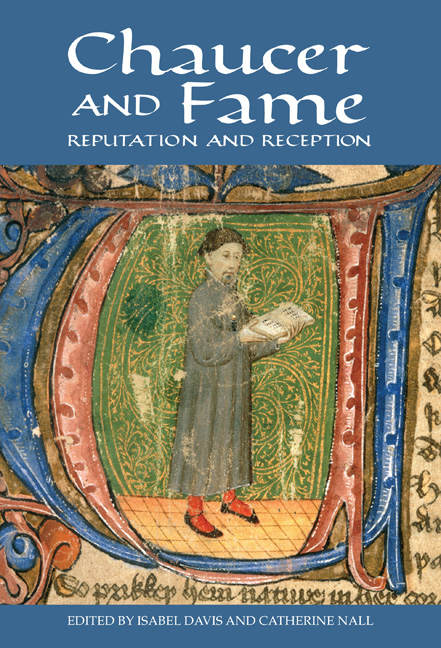Book contents
- Frontmatter
- Contents
- List of Illustrations
- List of Contributors
- Acknowledgements
- Introduction
- 1 Chaucer Joins the Schiera: The House of Fame, Italy and the Determination of Posterity
- 2 ‘I Wolde … han Hadde a Fame’: Dante, Fame and Infamy in Chaucer’s House of Fame
- 3 ‘And kis the Steppes where as thow Seest Pace’: Reconstructing the Spectral Canon in Statius and Chaucer
- 4 ‘I Nolde Sette at al that Noys a Grote’: Repudiating Infamy in Troilus and Criseyde and The House of Fame
- 5 The Early Reception of Chaucer’s The House of Fame
- 6 Fame’s Penitent: Deconstructive Chaucer Among the Lancastrians
- 7 After Deschamps: Chaucer’s French Fame
- 8 ‘Fresch Anamalit Termes’: The Contradictory Celebrity of Chaucer’s Aureation
- 9 Chaucer the Puritan
- 10 Revenant Chaucer: Early Modern Celebrity
- 11 Ancient Chaucer: Temporalities of Fame
- Bibliography
- Index
- Chaucer Studies
8 - ‘Fresch Anamalit Termes’: The Contradictory Celebrity of Chaucer’s Aureation
Published online by Cambridge University Press: 21 May 2021
- Frontmatter
- Contents
- List of Illustrations
- List of Contributors
- Acknowledgements
- Introduction
- 1 Chaucer Joins the Schiera: The House of Fame, Italy and the Determination of Posterity
- 2 ‘I Wolde … han Hadde a Fame’: Dante, Fame and Infamy in Chaucer’s House of Fame
- 3 ‘And kis the Steppes where as thow Seest Pace’: Reconstructing the Spectral Canon in Statius and Chaucer
- 4 ‘I Nolde Sette at al that Noys a Grote’: Repudiating Infamy in Troilus and Criseyde and The House of Fame
- 5 The Early Reception of Chaucer’s The House of Fame
- 6 Fame’s Penitent: Deconstructive Chaucer Among the Lancastrians
- 7 After Deschamps: Chaucer’s French Fame
- 8 ‘Fresch Anamalit Termes’: The Contradictory Celebrity of Chaucer’s Aureation
- 9 Chaucer the Puritan
- 10 Revenant Chaucer: Early Modern Celebrity
- 11 Ancient Chaucer: Temporalities of Fame
- Bibliography
- Index
- Chaucer Studies
Summary
Both the fifteenth and the sixteenth centuries hailed Chaucer as ‘the Father of English poetry’, and the moniker stuck. Seth Lerer has detailed the terminology of paternalism in the works of the fifteenth-century Chaucerians, and Lee Patterson describes the poetic genealogy developed through the sixteenth and seventeenth centuries, as it was claimed successively for (and by) Spenser, Milton and Dryden. This aspect of Chaucer's fame achieved a tenacious longevity, as well as a contemporary currency: his Wikipedia entry's opening sentence begins with the statement, ‘Geoffrey Chaucer … known as the Father of English literature’. What also persists doggedly in this popular representation is the sense that Chaucer's achievement, for which he deserves to be credited with literary paternity, lay primarily in what he did for (or to?) the English language. A recent BBC documentary repeated the ubiquitously (and erroneously) rehearsed claim that Chaucer's innovation and greatest contribution was to take the bold step of writing literature in English. However, if Chaucer was the father of English, the qualities for which the ‘English’ that he fathered was celebrated changed completely between the fifteenth and sixteenth centuries, or between the first and second generations of his eulogists.
This essay describes a fascinating U-turn in the history of Chaucer's reception: the contradiction between his medieval and his early modern linguistic fame. It traces a remarkable volte-face in the celebration of Chaucer's language between the late medieval and early modern periods, from initial acclamations of his aureate loftiness to the later establishment of his status as an icon of plain speech, and explores the reasons for it. Both perceptions, diametrically opposed as they were, were projections upon Chaucer, the convenient frontman, of their own politically motivated linguistic agendas, and they bespeak a fascinating climate of language and poetry in the service of power and politics. The first section of this essay sketches the fifteenthcentury and then (in greater depth) the sixteenth-century depictions of Father Chaucer's English, before the second contextualizes both depictions within the broader contention surrounding politicized language, showing how the linguistic debates of the Inkhorn Controversy (often thought of as so ‘humanist’) had their origins deep in the politics, as well as in the literary models, of their medieval past.
- Type
- Chapter
- Information
- Chaucer and FameReputation and Reception, pp. 143 - 164Publisher: Boydell & BrewerPrint publication year: 2015
- 1
- Cited by

